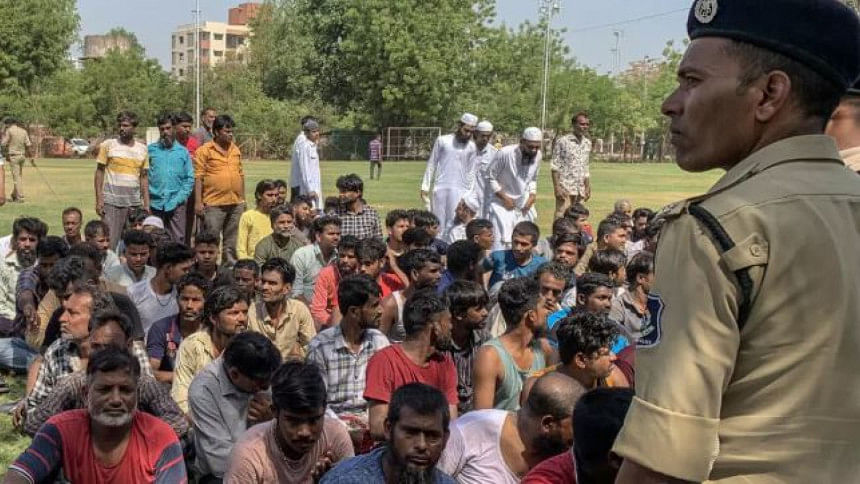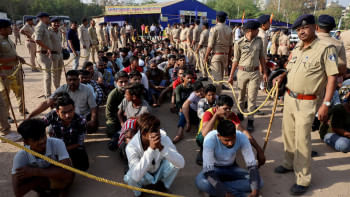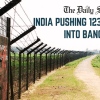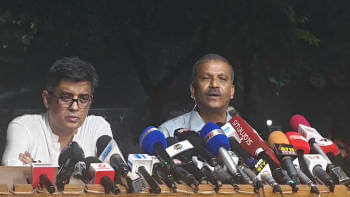From refugees to citizens: Whom is India pushing into Bangladesh?

July 16 was a special day this year. On this day, we observed July Martyrs Day for the first time, marking the ultimate sacrifices made by heroes like Abu Sayed and Md Wasim Akrum. Yet, while we remained focused on post-uprising efforts to rebuild the state through forging political consensus and reforming institutions, our border management seemingly slipped into disarray.
On July 17, Bangladeshi media reported that the day before, India had pushed 55 individuals across the border at four locations in Sylhet and Sunamganj. Citing Border Guard Bangladesh (BGB) sources, the report noted that these push-ins happened between 4am and 1pm.
The cumulative number of individuals forcibly pushed into Bangladesh may have already exceeded 2,000. Foreign Affairs Adviser M Touhid Hossain acknowledged that such incidents persist despite the existence of formal mechanisms between the two countries for verifying and returning nationals. "There is a prescribed process between the two countries to identify and take back citizens through the exchange of verified lists. Any push-in that circumvents this process is a clear violation of the rules," he said. While he confirmed that Bangladesh had recently accepted several citizens under this framework, he urged India to be consistent in adhering to the agreed-upon procedure.
Perhaps none of this is surprising. Earlier, on a separate occasion, the adviser admitted that push-ins were taking place, though he argued that physically resisting them was not a practical option.
This response seems entirely out of sync with the reality on the ground. One is left wondering whether our foreign ministry is even fully aware of the growing outrage among Bangalee politicians in India over these forced deportations. In BJP-governed states and at the national level, Bangla-speaking individuals—many of whom are Indian citizens—are increasingly being harassed and pushed across the border into Bangladesh. This issue has been festering for some time and is now reaching a critical point, especially in West Bengal.
In West Bengal, on July 16, Chief Minister Mamata Banerjee led a protest march in Kolkata. Speaking at the rally, she declared, "I have decided to speak more in Bangla from now on. Hold me in detention camps if you can," in direct defiance of the BJP's stance.
Banerjee highlighted that nearly 22 lakh Indian Bangalee migrant workers are employed across India and hold valid documents, including Aadhaar, Voter ID, and PAN (Permanent Account Number). "What right does the BJP have to harass Bangalees, arresting them and pushing them into Bangladesh? Is West Bengal not part of India?" she demanded the answer.
This was not her first public criticism of the Modi government's treatment of Bangla-speakers. On June 16, in the West Bengal State Assembly, she condemned the Maharashtra government for allegedly deporting individuals solely based on their use of the Bangla language, branding them arbitrarily as "Bangladeshis." In a recent incident, three Bangalee migrant workers were deported to Bangladesh only to be returned to India following an intervention by her administration.
In Bangladesh, several media outlets have reported detailed cases in which individuals pushed in by the Indian authorities were not Bangladeshis but Indian citizens and even Rohingya refugees who had sought shelter in India. Such practices are not only devoid of decency but also constitute serious breaches of international human rights and humanitarian law. Expelling one's own citizens to another country, or forcibly deporting refugees fleeing wars and persecution, violates fundamental norms and is a rare thing.
Although the foreign ministry in Bangladesh has sent multiple official communications to the Indian authorities, these textbook diplomatic measures have yielded little progress. The reality is that such tactics are unlikely to be effective in the near future, particularly given the electoral stakes in India. With crucial state assembly elections looming in West Bengal and Assam—states where Bangla-speaking and minority communities typically vote against the BJP—the ruling party appears to be exploiting nationalist sentiment for political gain.
While credible allegations exist of Indian interference in Bangladesh's internal politics over the years, Bangladesh has refrained from retaliating—a stance that should continue. But the continued mistreatment of Bangla-speaking individuals and the forced deportation of Indian citizens under the guise of identifying "illegal immigrants" must be firmly rejected.
It is time to consider reactivating a strategy that once proved effective: the push-back policy. Between 2003 and 2005, the then Bangladesh Rifles (BDR), predecessor to the BGB, implemented this approach, resulting in India's Border Security Force (BSF) to cease push-ins. The BSF resumed these actions at an alarming rate only in recent months.
The BGB must now be instructed to not only resist any unauthorised push-ins but also to return individuals who are forcibly sent across, swiftly and decisively, using any available border points. Such actions would send a strong, unambiguous message to New Delhi: that Bangladesh expects adherence to international norms, including the verification of citizenship at the point of detection and repatriation through proper consular cooperation.
The current situation is not merely a matter of diplomatic formality; it is about national dignity, human rights, and the protection of our sovereignty. A principled, firm and lawful response is not just justified—it is urgently required.
Kamal Ahmed is head of the Media Reform Commission in Bangladesh and an independent journalist. His X handle is @ahmedka1.
Views expressed in this article are the author's own.
Follow The Daily Star Opinion on Facebook for the latest opinions, commentaries and analyses by experts and professionals. To contribute your article or letter to The Daily Star Opinion, see our guidelines for submission.

 For all latest news, follow The Daily Star's Google News channel.
For all latest news, follow The Daily Star's Google News channel. 











Comments